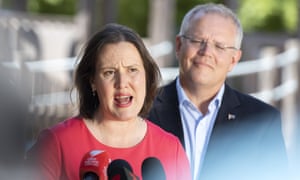Australians are rejecting the neoliberal economic values that define
the Liberals. Of these, O’Dwyer has consistently been a champion
Kelly O’Dwyer is the fourth minister to hold the industrial relations portfolio in the Australian federal government since the Coalition came to power in 2013.
That’s even one more IR minister than we’ve had prime ministers – and O’Dwyer’s just resigned.
The former bank executive announced she will not be recontesting her seat of Higgins in Melbourne’s well-heeled eastern suburbs. It’s the only seat to ever produce two prime ministers, and it has only ever elected Liberals. O’Dwyer was re-elected here in 2016 with a margin of 8%.
But, as disastrous recent outcomes for the Liberals in similar seats have shown, electorates that were once blue ribbon now more resemble tinsel shining from the bin. She is off.That’s even one more IR minister than we’ve had prime ministers – and O’Dwyer’s just resigned.
The former bank executive announced she will not be recontesting her seat of Higgins in Melbourne’s well-heeled eastern suburbs. It’s the only seat to ever produce two prime ministers, and it has only ever elected Liberals. O’Dwyer was re-elected here in 2016 with a margin of 8%.
There will be those who insist that her resignation is about anything other than her portfolio.
Her resignation from representing a party she’s alternatively called “the natural party for women” and – allegedly – one of “homophobic, anti-women climate-change-deniers” is, she says, in order to spend more time with her family.
It’s also fair to speculate that O’Dwyer’s factional alignment to the Liberal moderates compromised her ambitions when, outflanked by their internal rivals, August’s leadership coup rolled their man Turnbull.
But it’s certainly curious that a senior cabinet minister – a mere 42 years old and who as recently as May was kicking $50,000 into a Liberal women’s preselection fund – is calling it quits.
Rumours abound of disastrous internal polling in Higgins, thoroughly believable in the wake of both the wave that elected independent Kerryn Phelps in Wentworth, as well as the Liberals’ brutal routing in Victoria. Higgins’ Liberal margin narrowed over the course of the last election and, certainly, everyone’s aware that the small-l liberal Greens are a natural electoral threat in these leafy seats.
It all no doubt played a part. But it’s the context of these events that deserve analysis here.
Whether the Liberals can keep Higgins or not, it’s increasingly clear they can’t keep government. Their poll numbers remain disastrous across the board – neckings and resignations are symptoms of their panic. O’Dwyer is not even the only Liberal to resign this week; 11-year senator David Bushby quit on Friday.
The germ of the poll disease isn’t one growing from personnel, the coup or the “woman problem” – these are but secondary infections. What’s growing is an organic rejection by the Australian people of the neoliberal economic values that define the modern Liberal party. Of these, O’Dwyer has consistently been a champion – from her defence to a man living in poverty of company tax cuts to fund a $6,000 toaster, to her embarrassing public resistance to a royal commission into the banks which, she claimed, would be of “no benefit” to consumers.
But it’s what they’ve done in the industrial relations portfolio that defines the fundamental problem of the Liberal party.
Their union-busting, award-stripping, pro-casualisation policies have colluded entirely with a big business agenda, with the result that wage growth for working people is at an electorally enraging record low. And Australians have realised; no shred of Liberal policy or economic belief has any interest in raising them, nor in making anyone’s job more secure.
There have been the devastating penalty rate cuts that the Liberals and Nationals supported – voting to cut them eight times. O’Dwyer’s Coalition started the horrific $4-an-hour “PaTH” scheme that has hollowed out wages even further in the already low-paid sectors of hospitality and retail. Apprenticeships have vanished. Award-stripping continues, while insecure work has ballooned to 40% of the workforce. The government has ignored the underemployment explosion, and its disinterest in protecting workers from exploitation in the gig economy is profound.
Fighting unionism has continued, from some of the most restrictive labour laws in the OECD to a glaringly uneventful royal commission to the establishment of specialised anti-union “police forces”. Oh, and the government stacked another six pro-business ideologues into the Fair Work Commission, against objections from … the FWC president.
O’Dwyer personally backed big business against the courts, allowing employers to retroactively strip workers of court-ordered backpay with demands for repayment of leave loadings when their jobs were converted from casual to permanent. Her signature “achievement” – also, as minister for women – was a adding a mere five days of unpaid domestic violence leave to the national employment standards. This was expressly against recommendations of experts who said it should be paid leave, and for 10.
Irrespective of who the Liberals choose to lead them, who gets necked, who runs and who gets left behind, you have to ask yourself: what Australian working person would want to vote for this.
Commentators are online as I write this, speculating who could save Higgins for the Liberals. The resurrection of Peter Costello has been mooted. They may as well try to summon Harold Holt. Because it doesn’t matter if they preselect a woman, a moderate, someone who wants to be IR minister, or if they keep this seat or not. One truth remains: the Coalition has no plan to raise wages or make work more secure, and without one, you don’t need a tax cut for a $6,000 toaster to know they are toast.

No comments:
Post a Comment